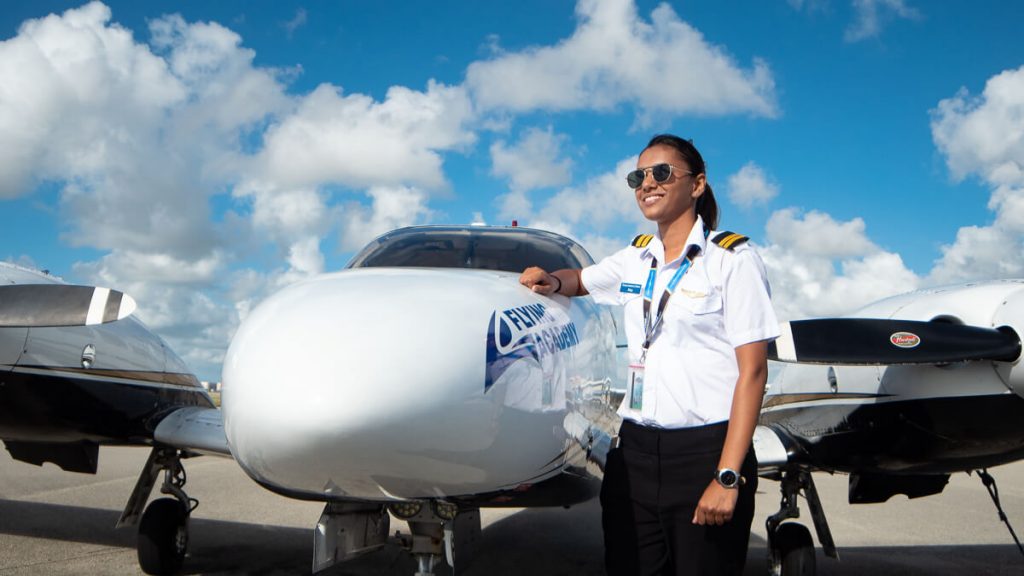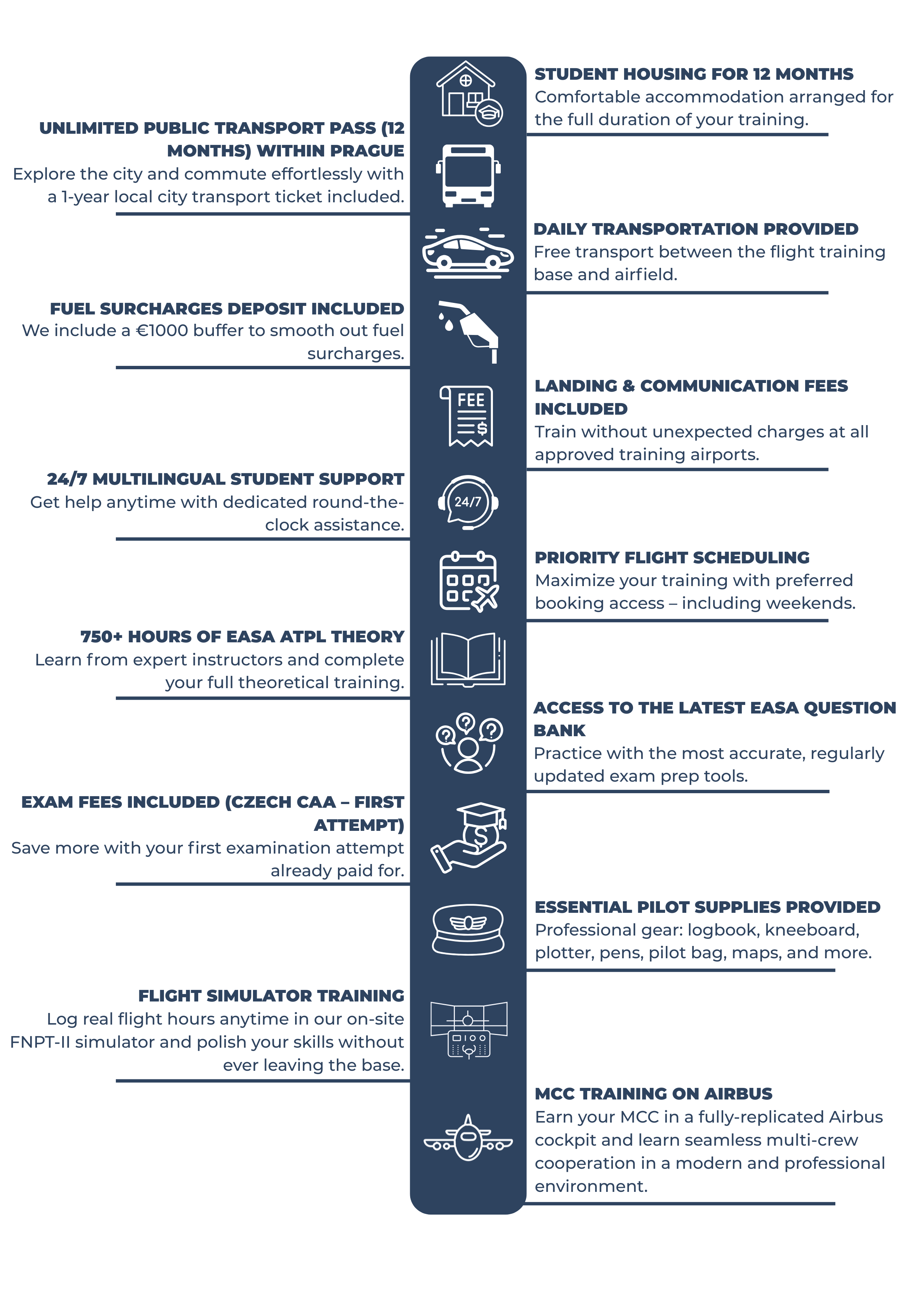
During the Integrated EASA ATPL(A), you will become a Commercial Pilot after 14 months of intensive preparation, from no flight experience to holding an EASA Multi-Engine, Instrument Rating, Commercial Pilot License with ATPL frozen, including Multi Crew Cooperation and Jet Orientation Course. The Integrated EASA ATPL is a full-time study programme with a fixed schedule conducted in a small group.
You will start with online ATPL Theory from the comfort of your home. Afterwards, you shall come to the school in the Czech Republic to carry out Phases I – VI of the training program. This organisation of training will decrease the costs of the training, providing you with high-quality theoretical training following the current trends, while allowing you to save on the living costs.
TRAINING COMPLETION
After successful completion of EASA Integrated ATPL, you will achieve:
-
ATPL theoretical knowledge training,
-
Commercial Pilot License with Multi Engine Instrument Rating (CPL with MEP/IR),
-
Multi Crew Cooperation (MCC) and Jet Orientation Course (JOC) completion certificate,
-
Advanced Upset Prevention and Recovery Training (UPRT).
CURRICULUM
ATPL Theory: 750 hours of theoretical instruction for all 14 ATPL Theory subjects. Passing the EASA ATPL(A) exams successfully is one of the most important steps in becoming a professional pilot.
Phase I: Basic Flight Skills
Get the strong foundation prior to the first solo flight. Develop the knowledge, skills, and habit patterns needed for a solo flight, including the basic maneuvers, airport operations, emergency procedures, and ground reference maneuvers.
Areas covered include:
-
Dual VFR
-
VFR Solo
-
ICAO preparation + language check
-
RT exam
-
Briefing/Debriefing
Phase II: Initiation to Complex Flying:
Develop your skills from the previous Phase with advanced maneuvers and practice cross-country flying.
Areas covered include:
-
Dual VFR
-
Dual IR (FNPT II Simulator)
-
PIC Solo VFR Cross-Country
-
Briefing/Debriefing
Phase III: Introduction to Commercial Flying:
Practice night flying and get proficiency, experience and confidence in cross-country operations.
Areas covered include:
-
Dual VFR Night
-
SPIC VFR Cross-Country
-
PIC Solo VFR Cross-Country
-
Dual Progress Test
-
Briefing/Debriefing
Phase IV: Advanced Flight Skills:
During this stage you will also complete your theoretical preparation for ATPL exams – 350 hours and pass the rest of the exams at the Civil Aviation Authority.
Areas covered include:
-
FNPT II Dual IR
-
Dual IR
-
SPIC IR
-
Dual VFR Night
-
PIC Solo VFR Night
-
MEP Dual VFR
-
MEP Dual IR
-
Briefing/Debriefing
Phase V: Advanced UPRT:
Understand how to cope with the psychological and physiological aspects of dynamic upsets in airplanes and develop strategies to mitigate those effects.
Areas covered include:
-
Dual Day-VFR
-
Briefing/Debriefing
Phase VI: MCC and JOC:
Get familiar with processes and procedures in a multi-pilot cockpit during MCC. MCC will make you feel more comfortable in the airliner cockpit and therefore give you a competitive advantage for an airline assessment. You can choose to do your training on the Airbus 320 or the FPS Boeing 737NG.
You have additional MCC training options in this phase.
You can request for:
-
APS MCC – Airline Pilot Standard Multi-Crew Cooperation:
-
Airbus 320 OR FPS Boeing 737NG
-
TRAINING OVERVIEW
GROUND TRAINING
Theoretical ground lessons lay the foundation for your practical training.
The ground preparation consists of 750 hours of theory delivered by our professional lecturers. During the training, from the 14 ATPL subjects, you will have 13 ATPL theory exams, that you must pass to prove a sufficient level of knowledge appropriate to the privileges of the holder of an ATPL(A) in accordance with the EASA Part FCL requirements. The exams will be conducted at the Civil Aviation Authority and will be scheduled by Flying Academy.
FLIGHT TRAINING
You can complete Phases 1, 2 and 3 before finishing ATPL Theory classes. Therefore, if the current situation changes we can adjust the training accordingly.
The practical training is conducted at one of our two bases in the Czech Republic – Prague and Brno.
The Integrated ATPL course is divided in 5 phases of training:
- Phase 1 – Basic flight skills
- Phase 2 – Initiation to complex flying
- Phase 3 – Introduction to Commercial flying
- Phase 4 – Advanced flight skills
- Phase 5 – Advanced UPRT
- Phase 6 – Multi Crew Cooperation & Jet Orientation Course
At the end of the program, the trainee will have flown: 198 hours, out of which
- 112.5 hours Dual (with FI),
- 116 hours under IFR,
- 20 hours SPIC,
- 50 hours on the simulator,
- 50 hours solo cross-country.






